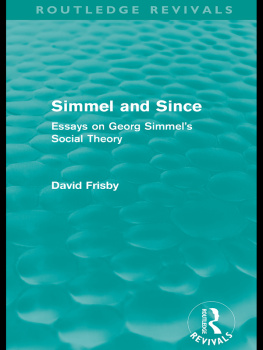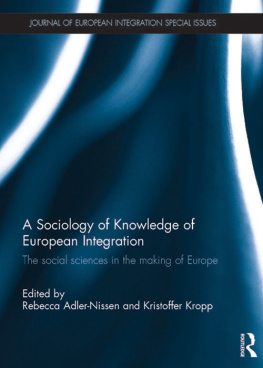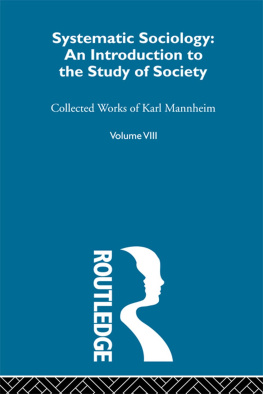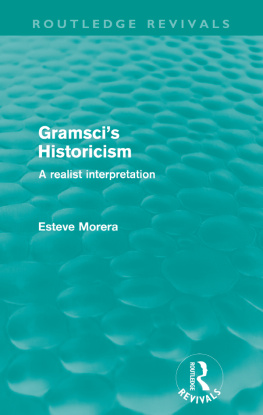
Routledge Revivals
The Alienated Mind
This book, first published in 1983, with a second edition in 1992, investigates the emergence of the sociology of knowledge in Germany in the critical period from 1918 to 1933. These years witnessed the development of distinctive paradigms centred on the works of Max Scheler, Georg Lukcs and Karl Mannheim. Each theorist sought to confront the base-superstructure models of the relationship between knowledge and society, which originated in Orthodox Marxism. David Frisbsy illustrates how these and other themes in the sociology of knowledge were contested through a detailed account of the central sociological debates in Weimar Germany. This reissue of The Alienated Mind will be of particular interest to students and academics concerned with the development of an important tradition in the sociology of knowledge and culture, social theory and German history.
The Alienated Mind
The Sociology of Knowledge in Germany 19181933
David Frisby

First published in 1983
Second edition 1992
by Routledge
This edition first published in 2013 by Routledge
2 Park Square, Milton Park, Abingdon, Oxon, OX14 4RN
Simultaneously published in the USA and Canada
by Routledge
711 Third Avenue, New York, NY 10017
Routledge is an imprint of the Taylor & Francis Group, an informa business
1983, 1992 David Frisby
All rights reserved. No part of this book may be reprinted or reproduced or utilised in any form or by any electronic, mechanical, or other means, now known or hereafter invented, including photocopying and recording, or in any information storage or retrieval system, without permission in writing from the publishers.
Publishers Note
The publisher has gone to great lengths to ensure the quality of this reprint but points out that some imperfections in the original copies may be apparent.
Disclaimer
The publisher has made every effort to trace copyright holders and welcomes correspondence from those they have been unable to contact.
A Library of Congress record exists under LC control number: 92002719
ISBN 13: 978-0-415-83122-2 (hbk)
ISBN 13: 978-0-203-76077-2 (ebk)
The Alienated Mind
The Sociology of Knowledge in Germany 19181933
David Frisby
Second Edition

First published in 1983
by Heinemann Educational Books Ltd, London
and Humanities Press Inc., Atlantic Highlands, New Jersey
Second edition published in 1992
by Routledge
11 New Fetter Lane, London EC4P 4EE
Simultaneously published in the USA and Canada
by Routledge
a division of Routledge, Chapman and Hall Inc.
29 West 35th Street, New York, NY 10001
1983, 1992 David Frisby
Printed in Great Britain by
Mackays of Chatham PLC, Chatham, Kent
All rights reserved. No part of this book may be reprinted or reproduced or utilized in any form or by any electronic, mechanical, or other means, now known or hereafter invented, including photocopying and recording, or in any information storage or retrieval system, without permission in writing from the publishers.
British Library Cataloguing in Publication Data
A catalogue record for this book is available from the British Library.
Library of Congress Cataloging in Publication Data
Frisby, David.
The alienated mind: the sociology of knowledge in Germany, 19181933/David Patrick Frisby. 2nd ed.
p. cm.
Includes bibliographical references and index.
1. Knowledge, Sociology of. 2. SociologyGermanyHistory20th century. I. Title.
BD175.F75 1992
306.42094309041dc20
92-2719
CIP
ISBN 0-415-05796-5
Contents
Since this study embodies the results of library research, my major debt must be to the following libraries and their staffs who made their facilities available to me: University of Glasgow Library, British Library of Political and Economic Science, Stadt und Universittsbibliothek, Frankfurt am Main, Universittsbibliothek Konstanz and Universittsbibliothek Heidelberg. Thanks are due to the Kanzler and the staff of the Universittsarchiv Heidelberg for access to Karl Mannheims files. David Kettler (Trent University) kindly made available to me two then unpublished Mannheim manuscripts as well as drafts of his own study of Mannheim. Dr Siebeck (Mohr Verlag, Tbingen) allowed me to consult Mannheims correspondence in the Mohr archives.
I also wish to thank the Leverhulme Trust for awarding me a European Fellowship, spent at the Universities of Konstanz and Heidelberg during the summers of 1976 and 1977 respectively. In this connection, I am grateful to Horst Baier (Konstanz) and Wolfgang Schluchter (Heidelberg) for their assistance and hospitality. Finally, I wish to acknowledge the encouragement of John Eldridge during the writing of the earlier draft of this study, which was accepted for a Ph.D. at Glasgow University in 1978. Thanks are also due to Tannia McLaren, who typed the original manuscript, and Pru Larsen for the much revised one.
Responsibility for the views contained in this study remain my own.
David Frisby
Glasgow
1982
Further reflections on the present study were facilitated by a grant from the Nuffield Foundation (for a different project) in the summer of 1991 at the University of Heidelberg. I am grateful to the Nuffield Foundation and to M. Rainer Lepsius and colleagues at the Heidelberg Institut fr Soziologie for their hospitality. Thanks are also due to Ann Adamson for typing the new Afterword.
David Frisby
1991
The following study does not pretend to be a comprehensive guide to the sociology of knowledge in Weimar Germany; rather, it concentrates upon the works of three writers, two of whom, Max Scheler and Karl Mannheim, are usually associated with its development. The early work of Georg Lukcs down to the publication of History and Class Consciousness is also presented since it provides the most forceful Marxist presentation of some of the central problems in the sociology of knowledge. This is quite apart from the relationship between Lukcs work and that of Mannheim.
Rather than summarising the many other contributions to the sociology of knowledge in Weimar Germany, attention is focused upon the central debates surrounding this tradition, since they illuminate its basic features. Even if we include Lukcs within the discourse concerning the sociology of knowledge, it is apparent that a starting point for all three central figures is a theory of culture and cultural crisis. In each case, the reflections that we associate with the sociology of knowledge emerge out of a theory of culture, usually a critique of contemporary culture that is seen to be in a state of crisis.
However, the diversity of reflections upon the relationship between knowledge and society is mirrored in the plurality of terms used to denote this area: Erkenntnissoziologie, Soziologie des Erkennens, Soziologie des Denkens, Soziologie des Wissens, Soziologie des Geistes and Wissenssoziologie. The act of cognition, thought, the mind, and simply knowledge, were all seen to be related to diverse aspects of society: group soul, social group, social strata, constellations of experience, and social classes.
Next page











